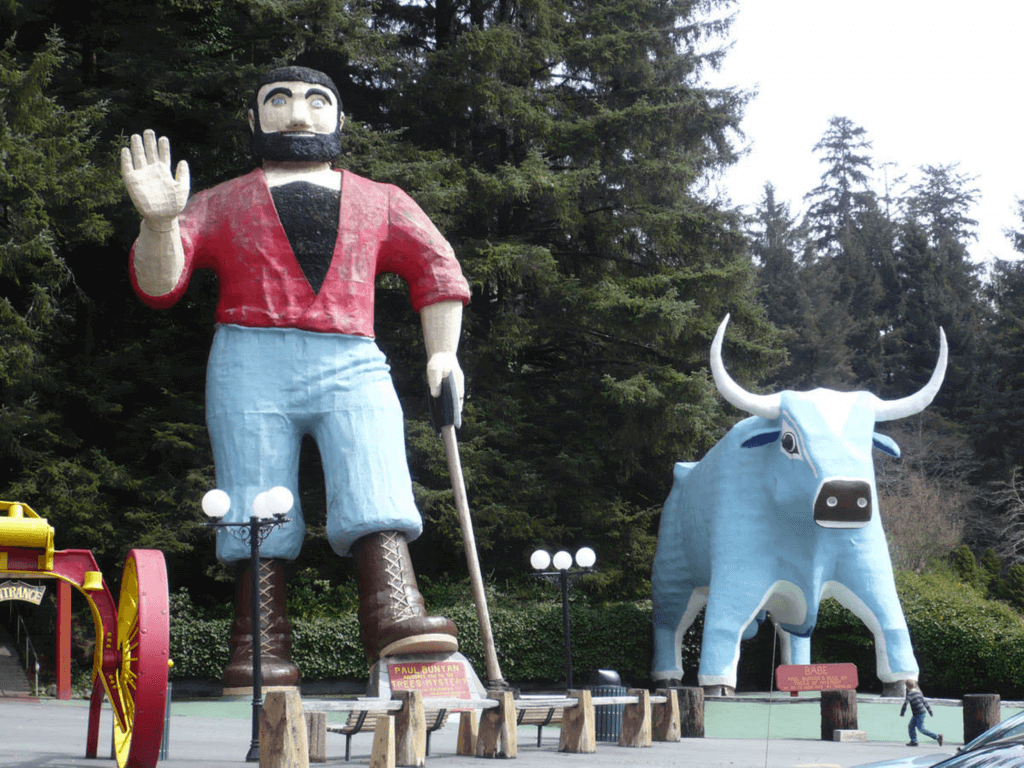Paul Bunyan Day
Paul Bunyan Day is observed next on Thursday, February 12th, 2026 (16 days from today).

History of Paul Bunyan Day
North American folklore is awash with stories of larger-than-life figures, but none of them are taller than the giant woodman Paul Bunyan, who is said to have traveled the continent with Babe, the cow his big green. Many cities and states across the United States pay tribute to Bunyan, some have erected statues of him, and some even claim that he is the son of their homeland. Some of the areas where Bunyan stands out include Bemidji, Brainerd and Akeley, in Minnesota; Bangor, Maine; and locations in Iowa, Wisconsin, Michigan and California. On Paul Bunyan Day, his legend is celebrated not only in these locations but around the world.
This celebration is particularly associated with Bangor, Maine. People believe that Bunyan was born in the woods outside the city on February 12, 1834. Coincidentally, this is also the day Bangor was founded. A 31-foot-tall statue of Bunyan stands in front of the Main Street Cross Insurance Center. It was gifted to the city by New York-based model-making company Messmore & Damon on the occasion of Bunyan and the city's 125th birthday. A time capsule stored inside it will be opened 125 years after it was placed there, on February 12, 2084.
Throughout history, the story of Paul Bunyan has changed and evolved into what it is today. One account states that Bunyan is based on Fabian "Joe" Fournier, a French-Canadian logger who moved to Michigan after the American Civil War. Known as Saginaw Joe, he was built strong, had giant hands, and was 6 feet tall. Rumor has it that he also has two sets of teeth. He is believed to have died in 1875 after being hit in the head with a mallet during a fight in Bay City, Michigan. After his death and the trial of his alleged killer, stories about him began to turn into fairy tales.
At some point, Fournier's story joins Bon Jean, a Franco-Canadian war hero, and Bunyan's story is reinforced. Bon Jean played a role in the Papineau Uprising in Canada in 1837. Bunyan's name is also derived from Bon Jean. The stories of Paul Bunyan, full of hype and exaggeration, were spread by word of mouth, passed down from generation to generation in logging communities and among woodworkers in the United States and Canada.
Stories written about Bunyan began to appear in the early twentieth century. One of the first stories to appear in print, titled "Round River," was written by James MacGillivray and printed in a local newspaper in Oscoda, Michigan, in 1906. Four years later, MacGillivray split share a collection of stories about Bunyan at the Detroit News Tribune. Bunyan first appeared in national print in 1912 when MacGillivray and a poet collaborated to create a poem for Lumberman magazine inspired by woodworkers.
In 1914, William Laughead - a logger and advertising manager for the Red River Timber Company - featured Bunyan in his company's brochure. This was the first time Bunyan was depicted with illustrations, and they helped spread his story across America. Laughead's illustration also introduces Babe the blue ox and gives her a name.
There are many legends surrounding Bunyan. It is said that he started logging business in the United States and that he hired big men to clear vast forests across the continent with him and Babe. It is said that his and Babe's footprints made 10,000 lakes in Minnesota, that he created the Great Lakes so Babe had a place to drink, that he created the Grand Canyon by pulling his ax, that he created Mount Hood by piling rocks to put out campfires, that he cleared all of South and North Dakota to farm, and that he could eat 50 pancakes a minute. These are all pretty impressive feats. Today we celebrate the giant lumberjack behind them.
Was Paul Bunyan a real person?
According to legend, it took five giant storks to deliver (already giant) infant Paul Bunyan to his parents in Bangor, Maine. As he got older, a mighty ax pull by the mighty woodcutter created the Grand Canyon, while the giant footprints of his trusted companion, Babe the Blue Ox, filled with water and became into the 10,000 lakes of Minnesota. Such sublime stories certainly span reality, but is Paul Bunyan himself a real person? The true story of this iconic character is a bit more complicated.
Historians believe that Bunyan was largely based on an actual lumberjack: Fabian Fournier, a French-Canadian lumberjack who moved south and took a job as foreman of a logging team in Michigan after the Civil War. Six feet tall (at a time when the average man could barely walk five feet) with huge hands, Fournier was nicknamed "Saginaw Joe". It is said that he has two complete sets of teeth, used to bite through wooden rails, and in his spare time he enjoys drinking and fighting. On a November night in 1875, Fournier was murdered in the notoriously noisy wooden town of Bay City, Michigan. His death, and the sensational trial of his alleged killer (who was acquitted), sparked stories of Saginaw Joe's tumultuous life — and his ability to cheat his cat in logging camps in Michigan, Minnesota, Wisconsin and beyond.
Over time, Fournier's legend merged with that of another French-Canadian lumberjack, Bon Jean. Jean played a prominent role in the 1837 Papineau Uprising, when loggers and other laborers in St. Eustache, Canada, rebelled against the British rule of the newly enthroned Queen Victoria. The French pronunciation of Jean's full name is thought to have evolved into the Bunyan surname.
Paul Bunyan's first story, "Round River," was printed in 1906, and was penned by journalist James MacGillivray for a local newspaper in Oscoda, Michigan. In 1912, MacGillivray collaborated with a poet to write a Bunyan-themed poem for the American magazine Lumberman, giving Paul Bunyan his first exposure to the nation. Two years later, an advertising campaign for Minnesota's Red River Timber Company featured the first illustrations of the larger-than-life lumberjack. Combined with pamphlets revolving around the stories of his exploits, his prominent appearance as Red River's mascot will help make Paul Bunyan a household name - and is an enduring symbol of America.
How to celebrate Paul Bunyan Day
Celebrate all things Paul Bunyan today. Here are some ideas to get you started:
- Visit one of the many Paul Bunyan statues. Some of the locations where you can find statues include Portland, Bangor, Bemidji, Brainerd, Akeley, Klamath and Cheshire. It is especially appropriate if you visit the statue in Bangor today, on the anniversary of the city's founding and the day they claim Paul Bunyan was born. See if any Paul Bunyan Day celebrations take place in Bangor or in any other city.
- Ride Paul Bunyan's Log Chute in the Mall of America.
- Visit the Paul Bunyan Log Camp Museum in Eau Claire.
- Make and eat a few coats.
- Watch the 1958 Paul Bunyan short, the 1995 Tale of Tales or the 2017 Bunyan & Babe cartoon.
- Tell stories around the campfire.
- Read books and stories about Paul Bunyan. Some examples include The Marvelous Exploits of Paul Bunyan by William Laughead, Paul Bunyan Swings His Ax by Dell J. McCormick and Paul Bunyan by Esther Shephard.
Observed
Paul Bunyan Day has been observed annually on February 12th.Dates
Monday, February 12th, 2024
Wednesday, February 12th, 2025
Thursday, February 12th, 2026
Friday, February 12th, 2027
Saturday, February 12th, 2028


